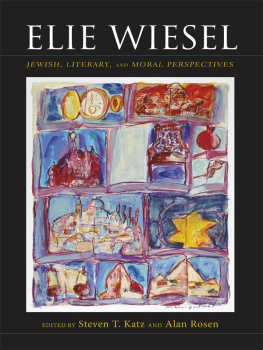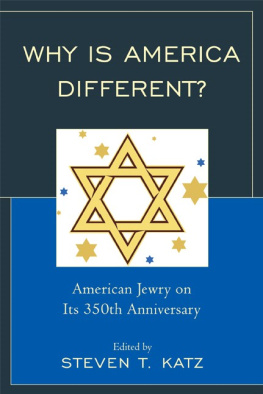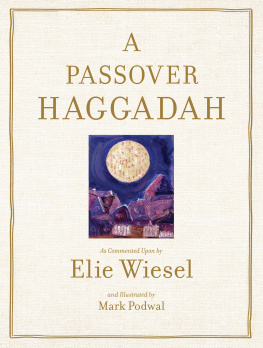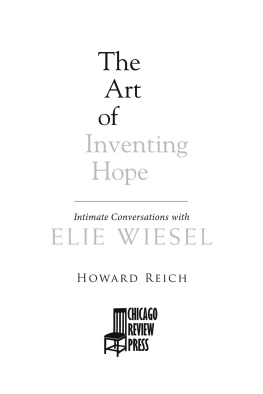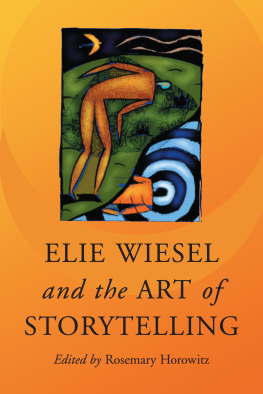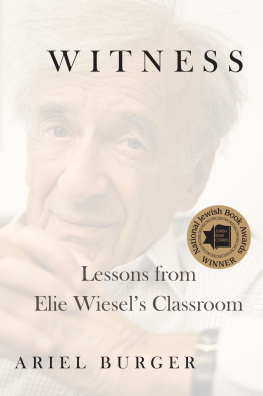T HE EDITORS OF THIS VOLUME owe a debt of gratitude to a number of individuals and institutions who made this work possible. First and foremost, we wish to thank the Mike and Shirley Grossman Conference Fund, which supplied much of the financial support for the original conference on which this volume is based. Mike Grossman was a supporter of all good things, and his concern to facilitate Jewish scholarship was palpable. Second, our thanks go to the staff of the Hillel House at Boston University and its wonderful director, Rabbi Joseph Polak, and to the staff of the Elie Wiesel Center for Judaic Studies at Boston University for their enormous efforts to see that every aspect of the original conference was a success. Third, we are deeply indebted to Pagiel Czoka, the former administrator of the Wiesel Center, who was unstinting in her support for both the original conference and the publication of this volume.
In addition, Alan Rosen would like to thank several colleagues and friends whose counsel was vital to the preparation of the volume: Yisrael Cohen, Adele Reinhartz, Florent Brayard, Ruth Clements Rosen, and Rabbis Joseph Polak and Nehemia Polen. Indiana University Press editor and director Janet Rabinowitch has been steadfast in her encouragement and has continuously provided thoughtful and detailed guidance.
1
ALONE WITH GOD
WIESEL'S WRITINGS ON THE BIBLE
JOEL ROSENBERG

B ETWEEN 1976 AND 2004, Elie Wiesel published four books devoted partly or wholly to biblical retellings: Messengers of God in 1976, Five Biblical Portraits in 1981, Sages and Dreamers in 1991, and Wise Men and Their Tales in 2004.
What is surprising, however, is that historian Cross and storyteller Wiesel were often curiously in harmony on matters biblical and scholarly. Cross voiced respect for Wiesel's immersion in the history of biblical interpretation, and Wiesel, in turn, his respect for the historian's quest. Both voiced a sympathy with the human need to live in uncertainty and ambiguity. When Wiesel, quoting a certain modern philosopher, said, Madness is not a consequence of uncertainty but of certainty, Cross warmly agreed. Both of them affirmed their deep and life-sustaining love of the text.
I find in this meeting of scientific historian and traditional darshan a curious portrait of my own involvement in biblical studies, which has grown up under the influence of both. Like the archaeologist, I am fascinated with what comes out of the ground, as the partial imprint of both material and social history. Like the darshan, I am interested in the Hebrew Bible's history of interpretation and in the spiritual dimension of the biblical storyand, in this pursuit, I find in postbiblical commentary a continuity with the Bible's own pre-textual tradition history. In a sense, both the historian and the darshan are approaching the same truth, albeit in strikingly opposed ways: one through skepticism, a state vital to human inquiry, and the other through faith, a state, one might say, vital to human survival. Skepticism holds truth to be hard-won and beheld in a state of ambiguity. Faith's own skepticism, as Wiesel helps us to see, holds truth to be the fruit of being alone with God and bearing witness to the ambiguity of Creation.
It is important to remember that Wiesel's approach to the Bible is deeply rooted in a sense of the text that has shaped modern Jewish academic study of the Bible as much as the literature of faith. This allowed for intrabiblical allusion to deepen the meaning of a biblical story in a manner unforeseen by the biblical writers themselves.
Wiesel's own sources span an impressive range within Jewish tradition: the Apocrypha and Pseudepigrapha, Avot de Rabbi Natan, Mishnah, Midrash Rabbah, Midrash Tanhuma, Midrash Tehillim, Pirke de Rabbi Eliezer, the Palestinian and Babylonian Talmuds, medieval commentators such as Rashi, Ibn Ezra, and Nahmanides; the Zohar; the sixteenth-century collection Divrei ha-Yamim shel Moshe Rabbenu; hasidic writings, including those of Shneur Zalman of Ladi, the Gerer Rebbe, and the Kotzker Rebbe, as well as modern scholars such as Louis Ginzberg, Shalom Spiegel, David Daiches, Nahum Glatzer, Ephraim Urbach, and Andr Neher. But Ginzberg's voice was always that of the compiler, what I would call the traditionist. Wiesel's, by contrast, bears the rhythms of the storyteller, albeit intercut with the voice of commentatora distinctive kind of pedagogical voice, somewhere midway between narrative and exegesis, casually mixing into his exposition rabbinic and later lore as he talks us through the biblical story.
Apocryphal, rabbinic, and later Jewish lore afford him, for example, the procession of angels and seraphim that accompanies the funeral of Adam; Noah's disbelief in the reality of the impending Flood until the water was lapping about his ankles; the presence of Satan in precipitating the sacrifice of Isaac; the river that Satan turned into to prevent Abraham's ascent to Mt. Moriah; Isaac's authoring of the Mincha service; the Torah academies of Shem and Ever, where Jacob studied upon leaving home; Moses's unsuccessful pleading with heaven and earth for the right to enter the Promised Land before his death; Joshua's forgetting three hundred commandments and acquiring seven hundred doubts, in his grief and uncertainty after the death of Moses; Jephthah's grisly death by losing his limbs, one by one, among the cities of Gilead, in punishment for sacrificing his daughter. Perhaps most poignantly, rabbinic lore provides Elijah's transformation from our most stern, unyielding, and zealous prophet to become, in Wiesel's words the friend and companion to all who lack friendship, comfort, and hope, appearing in many guises through postbiblical Jewish history, watching over the people Israel and the individual Jew, visiting the Passover seder, and presiding over the ceremony of berit milah and the entrance of the convert to the faith. According to Midrash, Samson was the prototype of the Messiah. Saul was pure and innocent. Isaiah and Jeremiah were born circumcised. Jeremiah beheld Mother Zion as an old woman in mourning, dressed in black. Jonah's entry into the belly of a giant fish was like a person standing at the entrance to a synagogue (a notion that surely had resonance for a congregation reciting Jonah's story on Yom Kippur). In Midrash, Abraham in his old age twice visited his estranged son Ishmael and, finding him absent, interacted with Ishmael's wifeonce unhappily, in the case of the Moabite wife Aissa, and once happily, in the case of the Egyptian wife Fatima. The biblical world thus richly embellished from the rabbinic universe turns into a web of celestial causality and intrabiblical reverberation.
Direct and indirect reference to modern experience, and especially the Shoah, is present here, as well, of course, though perhaps less than one might expect. Cain's murder of Abel is, at any rate, not just the first murder, nor the first relationship of assassin and victim, or executioner and victim, but also the first genocidea wiping out of half the human race of Cain's generation.
Such, at any rate, is the biblical world that emerges in Messengers of God, Wiesel's first and perhaps theologically most radical study of the Bible. His sympathies seem chiefly to rest with those who defend the innocent and the helpless against the powerful, but also with the guilty who are driven into crime under extenuating circumstances, and with those who search behind the masque of guilt and innocence for a scheme of divine justice that is in hiding. And so, the biblical heroes of this collection typically pick fights with God: Cain in response to the goading of God's discrimination and the absence of divine reassurance; Abraham in testing God's resolve by actually obeying the fearsome divine command to sacrifice his son, binding Isaac upon the altar and raising the knife. Jacob, in his turn, for being the most undistinguished patriarch, and bearing the burden, as well, of a survivor's child. And Job, perhaps most pugnaciously of all, in a quest for knowledge. In Wiesel's words: He would gladly have sacrificed his soul for knowledge. What he demanded was neither happiness nor reparations, but an answer. He defied [God, in order] to come closer to Him. He preferred a cruel and unjust God to an indifferent God.

